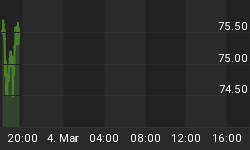Gold Gives Back 2% Bounce as US Job Losses Slow, Rising Bond Yields Negate Central-Bank Buying
THE PRICE OF GOLD slumped by $20 per ounce ahead of the Wall Street opening on Friday, unwinding all of Thursday's gains and heading for a weekly loss at $963 after official data showed the pace of job losses in the United States slowing sharply.
Crude oil held above $68 per barrel and world stock markets leapt, adding more than 2.4% to London's FTSE100.
The US Dollar pushed higher on the currency markets.
"Price action over the next 48 hour will be critical to see if gold has seen its highs at 990 or if this drop to 961 was just a healthy correction," said Russell Browne at Scotia Mocatta in London after Thursday's 2% bounce for US, Euro and Sterling gold buyers.
"Some medium- to longer-term Gold Investment has come in on longer-term inflation fears," reckons Charles Dowsett at ABN Amro in Sydney, speaking to Bloomberg.
"As governments print more money to spend on stimulus packages, the view is eventually that it will push inflation."
Venezuela yesterday reported 8.9% inflation in consumer prices for 2009 to date. Pakistan reported a slowdown to 17% annual price inflation.
Here in the UK, factory output prices rose 0.4% last month from April, while input prices fell by almost one tenth from a year ago. Data released earlier this week showed growth in the money supply for UK households dropping to a fresh series low, while bank lending to non-financial businesses shrank for the 12th month running.
"There are clearly signs of optimism that the worst of the recession is over," says UniCredit fixed-income analyst Kornelius Purps, also speaking today to Bloomberg.
"Each and every indicator is pointing to the bottom of the economic cycle now being behind us."
Analyst forecasts had pegged non-farm US job losses at 521,000 for May, but the first official estimate today showed only a 345,000 drop.
The unemployment rate jumped to a 25-year high of 9.4% however, with 7 million American's losing their job since the recession began in Dec. 2007.
Unemployment in Canada also jumped last month, hitting an 11-year high of 8.4% according to official data on Friday.
"The Bank of Canada 'promises' low rates for the next year at least," writes Steven Barrow, currency strategist at Standard Bank. "The Swedish Riksbank has trumped it by pre-committing to near-zero rates for the next 18 months.
"We can't be sure that the likes of the Fed and Bank of England (who have avoided these pre-commitments) are thinking in the same terms. However, we would not be surprised."
Despite continued quantitative easing of longer-term interest rates by both the US and UK central banks this week, government bond yields rose further on Friday as prices fell.
The rate of return offered by 10-year Treasuries rose to 3.74%, the highest level since the Fed began its "queasing" in November.
Ten-year UK gilt yields jumped to 3.87%, a four-month high that undoes the Bank of England's £125 billion bond-buying program to date.
The British Pound meantime bounced one cent to the Dollar after dropping from $1.6650 to $1.6000 this week, capping the Gold Price in Sterling at a 3-week high of £612 per ounce.
Gordon Brown's government was hit by a third ministerial resignation overnight, and "the panic is palpable" according to Philip Stephens at the Financial Times after early results from yesterday's European and local council elections showing sharp losses for the Labour party.
Finance minister Alistair Darling was confirmed in his job at this morning's cabinet reshuffle.
The Pound has dropped half its value in gold since he took over from Brown as Chancellor in mid-2007. UK government debt has swelled to 55% of annual economic output, and may reach 100% of GDP by 2013 according to ratings agency Standard & Poor's.
"Projected gross issuance by [developed world] governments will jump to almost $12,000 billion of debt compared with $9,000bn two years ago and many times the level a decade ago," writes Gillian Tett today, also in the FT.
"The US alone is projected to sell almost $8,000bn in gross terms."
One of the busiest places in the financial district of Boston these days - home to mutual-fund giants Fidelity, Putnam, MFS and Wellington, writes Brett Arends at the Wall Street Journal - is J.J. Teaparty, "a well-known shop dealing in bullion and rare coins.
"A number of local mutual fund managers - 'stocks for the long run' notwithstanding - have been seen sneaking off during their lunch hours to do the same."
















